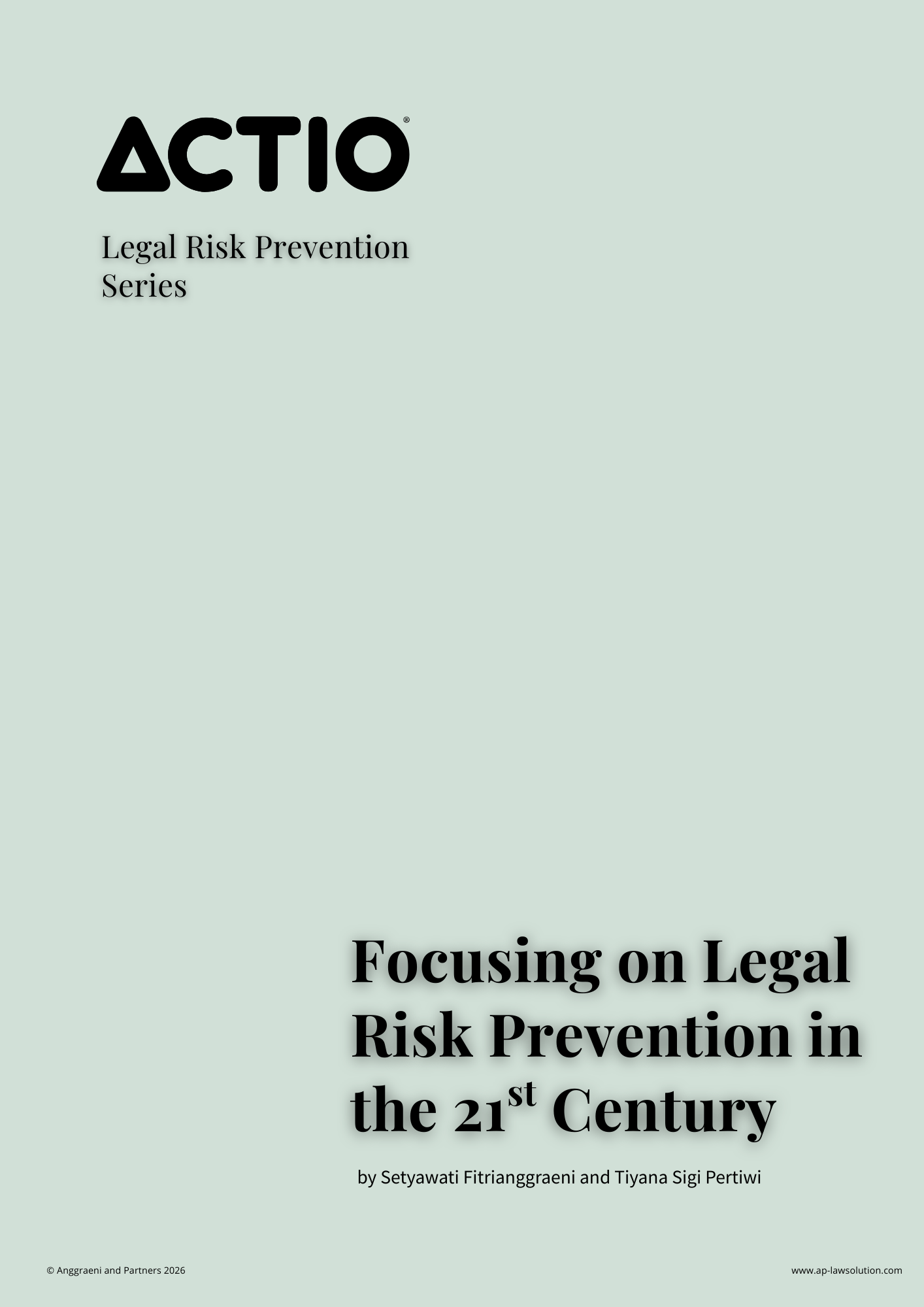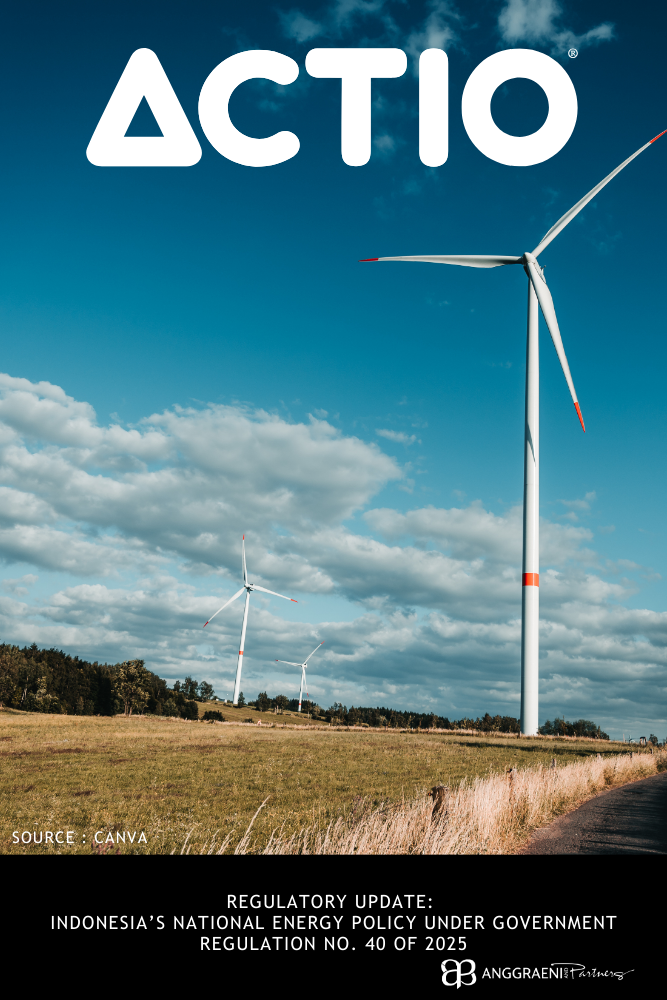- Home
- Capabilities
- ACTIO® Hub
- About Us
- Connect with Us
- AP Library
By Setyawati Fitrianggraeni, Taufik Nuariansyah
Corporate criminal liability for the trade of non-excise or illegal goods in Indonesian ports is a critical legal concern with far-reaching economic and security ramifications. Such illicit activities inflict substantial state losses, threaten national security, and disrupt the integrity of maritime supply chains—directly undermining the principles of the Blue Economy. This article analyses the legal framework of corporate accountability in illegal trade, reviews key case precedents, and addresses doctrinal challenges. It provides a comprehensive analysis for regulators, industry stakeholders, and legal practitioners operating within the maritime sector.
As the main gateway for international trade, ports in Indonesia represent vulnerable points for illicit activities, making corporate criminal liability a highly relevant topic. This issue concerns how corporations, as legal entities, can be held criminally accountable for trading goods that evade customs duties, such as illicit cigarettes, or entirely illegal goods, such as narcotics and smuggled weapons.[1] Such illicit trade not only causes the state losses amounting to trillions of rupiah annually but also endangers national security, public health, and the integrity of global supply chains. The significance of this topic is underscored by the evolution of Indonesian criminal law, which has shifted from focusing solely on individual liability to recognizing corporations as punishable subjects under various special laws.
Domestically, this issue is at the center of the government’s agenda to strengthen security oversight of the entry of illegal goods into the country, as reflected in the National Long-Term Development Plan (RPJMN[2]). Regionally, as a key member of the ASEAN Economic Community, Indonesia plays a crucial role in combating cross-border smuggling. Globally, illicit trade in Indonesian ports intersects with broader transnational concerns—including human trafficking, narcotics smuggling, and the circulation of counterfeit goods—that threaten international economic security. These dynamics are addressed by international legal instruments like the United Nations Convention against Transnational Organized Crime (UNTOC), which emphasizes holding corporate entities accountable in the fight against organized criminal networks.
The main discussion of this article will cover: (1) the legal framework of corporate criminal liability in Indonesia, (2) analysis of relevant cases, and (3) policy and operational implications for the port sector. The scope is limited to corporate criminal liability in Indonesian ports concerning non-excise and illegal goods, with the objective of examining how such liability is applied and what challenges remain.
The doctrine of vicarious liability, within the Indonesian legal system, is more commonly referred to as substituted liability (pertanggungjawaban pengganti) or more broadly as corporate liability (pertanggungjawaban korporasi). In the development of the Indonesian Penal Code (KUHP), vicarious liability is treated as an exception to the fundamental principle of “no punishment without fault” (asas tiada pidana tanpa kesalahan)[3]. Its application is grounded in several core legislative instruments. Notably, Law No. 39 of 2007 on Excise imposes criminal sanctions on the trade of non-excise goods, while Law No. 17 of 2006 on Customs governs offenses related to smuggling within port areas, particularly through Articles 102A to 102F. These provisions explicitly affirm that corporations, through their directors or key personnel—may bear criminal liability.
Additionally, Law No. 7 of 2014 on Trade strengthens this legal structure by prohibiting illegal commercial activities and enabling administrative sanctions, including business license revocation. Collectively, these national regulations are aligned with Indonesia’s international commitments, particularly through its ratification of the United Nations Convention against Transnational Organized Crime (UNTOC) under Law No. 5 of 2009, which advocates for corporate accountability in the context of organized crime.
The illicit practice of organized smuggling conducted by corporations bears resemblance to acts of corruption. This is because corporate involvement in smuggling activities poses a serious threat to the state’s financial stability, ultimately hindering national development and obstructing the long-term realization of public welfare and economic prosperity[4].
Furthermore, corporate criminal liability in the context of illegal trade at Indonesian ports is closely linked to the concept of the blue economy and the Indonesian Maritime Policy, as outlined in Presidential Regulation No. 16 of 2017. This regulation defines the Indonesian Maritime Policy as a general policy framework accompanied by implementation measures through ministerial and institutional programs and activities, with the overarching goal of establishing Indonesia as a Global Maritime Fulcrum[5]. The blue economy, as an integral component of this policy framework, emphasizes the sustainable utilization of marine resources to generate employment, increase national income, and ensure food security—while preserving the health of marine ecosystems[6]. However, the illicit trade of non-excise or illegal goods at ports undermines these principles by causing substantial economic losses to the state, compromising the integrity of the maritime sector, and obstructing sustainable development efforts. Accordingly, the enforcement of corporate criminal liability serves as a critical instrument in supporting the implementation of Presidential Regulation No. 16 of 2017, by ensuring that economic activities within the maritime sector are free from illegal practices that threaten the long-term viability of the blue economy—such as smuggling, which can disrupt maritime supply chains and endanger national maritime security
Several notable cases warrant particular attention, as outlined below:
The Criminal Investigation Agency of the Indonesian National Police (Bareskrim Polri) uncovered a smuggling scheme involving the illegal importation of steel wire ropes into Indonesia. The perpetrators manipulated import documentation by altering tariff post numbers in order to evade regulatory controls. Specifically, the fraudulent documents omitted disclosure of the company’s purchase of the steel wire ropes. The suspect, acting in their capacity as the company’s director, modified the import records to avoid the mandatory registration of the goods under Indonesia’s National Standard (SNI) requirements. Authorities seized at least 45 rolls of steel wire ropes of various sizes in connection with the case. By bypassing proper customs procedures, the suspect unlawfully benefited from the exemption of import duties and taxes.[7]
The Illegal Imports Task Force (Satgas Impor Ilegal) established by the Ministry of Trade is currently investigating the involvement of a logistics company in a case concerning the unlawful importation of goods owned by a foreign national (WNA). The case came to light following a surprise inspection by the Minister of Trade and the Task Force in Kapuk Kamal Raya, Penjaringan District, North Jakarta. During the operation, authorities discovered a warehouse filled with illegally imported goods, including smartphones, computers, tablets, garments, children’s toys, footwear, and various electronic items. The inspection underscores the government’s increasing scrutiny of logistics firms that may be complicit, either directly or indirectly, in facilitating the entry and distribution of prohibited goods.[8]
The Ministry of Finance, through the Directorate General of Customs and Excise, has imposed administrative sanctions on 15 companies found to be in violation of the regulations governing Bonded Logistics Centers (Pusat Logistik Berikat/PLB). According to the Director General of Customs and Excise, Heru Pambudi, these companies were penalized for non-compliance with PLB operational provisions. Should such violations be identified and investigated by Customs, the implicated companies may face not only asset seizures but also potential criminal charges under applicable Indonesian law.[9]
Although these legal standards are often debated in court, their consistent enforcement is fundamental to strengthening Indonesia’s reputation as a secure and reliable maritime hub. In the context of the Global Maritime Fulcrum vision, robust customs enforcement directly contributes to safeguarding state revenues, which can be reinvested into port infrastructure and maritime security. The government, through the Ministry of Finance and Customs, has implemented the National Single Window (NSW) to integrate port data and reduce loopholes[10]. However, governance weaknesses—while showing signs of improvement as reflected in Indonesia’s 2024 Corruption Perceptions Index (CPI)[11], which rose to 37/100 from 34/100 the previous year—remain a significant challenge. This underscores the ongoing need for stronger corporate governance mechanisms and rigorous internal audit practices, aligned with anti-money laundering regulations, to ensure that corporations are not complicit in illicit activities
The enforcement of corporate criminal liability at Indonesian ports is more than a punitive act—it is a strategic commitment to defending Indonesia’s economic sovereignty and maritime integrity. Each successful case signals that Indonesia’s ports are governed by transparency, accountability, and the rule of law. This commitment safeguards state revenues, protects supply chain resilience, and ensures alignment with the long-term goals of the Blue Economy and Global Maritime Fulcrum. Moving forward, continued investment in corporate compliance systems, inter-agency coordination, and digital oversight will be essential in creating a lawful and sustainable maritime sector that upholds Indonesia’s global credibility and economic resilience.(TNH)
Bibliography
For further information, please contact:
P: 6221. 7278 7678, 72795001
H: +62 811 8800 427
Anggraeni and Partners is a boutique Indonesian law firm with global foresight, trusted by multinationals for dispute resolution, pre-dispute advisory, and regulatory consulting in ocean-maritime, energy, technology, and trade. Discuss further with us at connect@ap-lawsolution.net.
S.F. Anggraeni
Managing Partner
Taufik Nuariansyah
Associate


